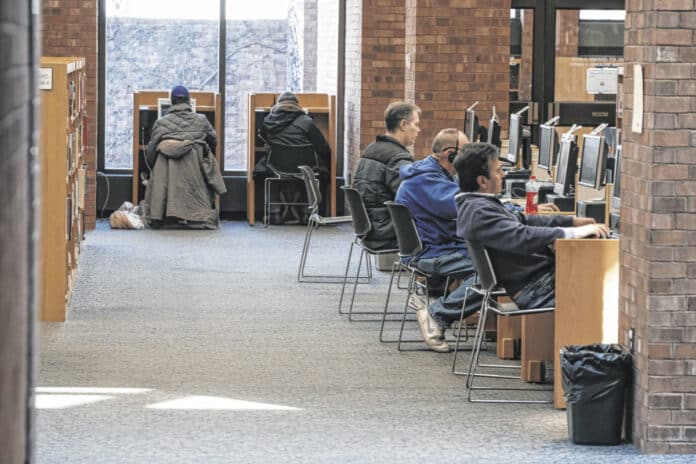COLUMBUS, Ind. — A newly completed survey and study of Bartholomew County broadband service says one out of four Bartholomew County residents have no home internet service.
The largest density of customers in Bartholomew County who need access to high-speed broadband internet is in western and southwestern areas of the county, according to Bartholomew County Broadband Initiative Committee chairman Tony London, who is also a Bartholomew County commissioner, London says areas most in need include sections of Jackson, Ohio, Wayne and parts of Harrison Township.
This week, it was announced that four providers have already been chosen through a federal bidding process to serve different areas of Bartholomew County.
Jackson County REMC plans to bring fiber optic lines to parts of Sandcreek Township as early as next year, while Charter Communications, Inc. had committed to installing high-speed internet to rural areas in southwestern areas, London said.
London told Bartholomew County Council members Tuesday that Mercury Wireless is expected to bring broadband to northwest sections, while a company called Dell TD is making plans to move ahead with plans to serve northeast areas, London said.
“While lots of things are happening, nothing has been set in stone (in terms of timetables),” he said.
Although many counties have a goal of achieving countywide broadband in six years, London said he anticipates it might take a slightly longer period of time locally.
Even with four new providers, there will still be rural homes without broadband internet, so Bartholomew County officials are trying to work with other providers to identify and fill in gaps in the coverage area, London said. Conversations are currently underway in regard to specific areas and the number of homes each provider will serve, he said.
About $250 million in new money is coming from federal and state coffers to help pave the way for rural broadband internet across Indiana. On the local scene, Bartholomew County Auditor Pia O’Connor has already set aside about $450,000 from federal CARES act money provided to assist with COVID-19 needs.
In addition, the Bartholomew County commissioners are considering using money from their telecommunications fund for rural broadband service. While that fund currently had $905,000, O’Connor says half of that money is earmarked for future information technology in new county buildings.
While there are other financial sources available, most require matching funds, so more money won’t be possible without financial assistance from the Bartholomew County Council, London said. Specific funding proposals are expected in the next three to four months.
In order to be enticed into filling gaps in coverage, other internet providers will need to know several key facts, such as those included in the recently-released survey results of over 2,100 individuals or families, London said.
The survey will also help local officials know what obstacles and challenges they need to remove in order to attract service providers, London explained. Changes might include reworking ordinances that make it difficult to bury cable in the right of way, as well as finding ways to extending fiber optic cable in a more cost-effective way, he said.
“We’re trying to make Bartholomew County look as attractive as possible,” county commissioners chairman Larry Kleinhenz said. “We don’t want (internet providers) to wait six years to come here. We want them here — like last week.”
Insufficient service
The county’s internet survey was offered in December through email and social media. Survey data was gathered and analyzed under the direction of Dr. Roberto Gallardo, assistant director of the Purdue Center for Regional Development.
Results confirmed something London predicted in December: Many people who believe they have high-speed broadband internet actually don’t have it, he said.
Speed tests show 61.2% of respondents have internet service that does not meet the federal definition of broadband, which is 25 megabits per second download and 3 megabits per second upload, the survey states.
“We literally have people paying for internet getting .02 megabits download,” London said. “I mean, they might as well send a carrier pigeon, and it will get there faster.”
What concerns Gallardo and London the most is that 60% of respondents are unsatisfied with their connection, with the same percentage saying their service is not reliable enough to do work or eLearning from home.
“The issue becomes the quality of internet access,” Gallardo said. “Does it meet the needs of the folks?”
Current internet needs range from people working from home and kids engaged in eLearning to Telehealth sessions for people who can’t get to their doctor’s appointments, London said.
“Most people say the internet service they have is too slow to do what they need to do,” Gallardo said.
If the internet won’t support 60% of local residents now, it will be even worse five years from now, London said.
“Refrigerators, washing machines, televisions, more computers … all these things will eventually be dependent on the internet. And you must have a lot more broadband to do that.”
In addition, it’s going to become hard to sell a house that doesn’t provide broadband service, London said.
Other survey details
When the survey was taken in December, most public school students were engaged in eLearning. That explains why survey results show 20.8% of online Bartholomew County residents are elementary or middle school students, while 11.2% are enrolled in high school.
“COVID-19 has blown everything out of proportion,” London told the county council. “But do we think problems will go away when the virus goes away? The answer is no.”
Among adults, 16.4% of total respondents said they have a home-based business. About one quarter of all respondents are between 26 and 45 years old, while 23.7% are between 46 and 65 years of age. The survey also indicates nearly one out of 10 are 65 or older.
The number one reason given in the survey for not being online at home is that service isn’t available (25.5%). That’s followed by 17.5% who have a smartphone data plan, and 15.8% who say internet service isn’t reliable in their area. There are also those who feel home internet is too expensive (13.1%).
Gallardo’s survey also shows what local residents are currently paying for their service, as well as how much they are willing to pay for broadband.
When 1,279 residents were asked how much they currently pay per month, the top answer was $75 or more a month (31.9%), followed very closely with $50 to $74.99 (31%). Other responses were less than $20 (17.7%); $35 to $49.99 (11.8%); and $20 to $34.99 (7.6%).
In regard to how much respondents are willing to pay for the service, the top answer was $50 to $74.99 (33.2%). The survey states 26.1% are willing to go over $75 a month, but a nearly equal number of respondents (26.2%) want quality service for between $35 and $49.99 a month. About 14.6% said they’re only willing to pay less than $35.
Who are the providers
The backbone of nearly every internet plan is fiber-optic based, with information traveling the speed of light, London said. The provider is often the person who brings the fiber optic internet from a outside utility pole into your home, he said.
The top providers are cable companies (46%), while 18% receive their internet service through a satellite, according to the survey. Those who are hooked-up by a digital subscriber line total 16.5%, while 7% rely on a fixed wireless service, the data states.
Only one out of every 100 families or individuals have providers who maintain fiber optic cable all the way into their homes, the survey suggests. Ultimately, it costs an average of $50,000 a mile to install broadband internet.
“The difficulty is building off roads like 600S and 700S — all those other roads that only have three to five houses on them,” county commissioners chairman Larry Kleinhenz told the county council. “When you have to run five miles of fiber optic to reach them (at a cost of $300,000), there’s no payback on it.
Kleinhenz said the total cost to install broadband internet across all of Bartholomew County would be about $30 million.
After London told the county council total costs to expand internet across the entire county are estimated at $30 million, many council members had a less-than-positive reaction. Bill Lentz described the costs quoted by London as “astronomical.”
“You shared a lot of cases where people need the internet, and I can show you a lot of cases where people are overtaxed right now,” Lentz told London.
Another council member, Mark Gorbett, expressed discomfort with the idea of giving public money to private companies for projects that can’t be funded on the free market. Council president Scott Bonnell suggested many internet problems would diminish after the pandemic ends. Evelyn Pence asked London to check out a less expensive provider already serving Bartholomew County, while Matt Miller emphasized county government will not compete with private businesses.
But London assured the council most of the money will come from federal and state government, who have made rural broadband to all homes a priority for the future.





